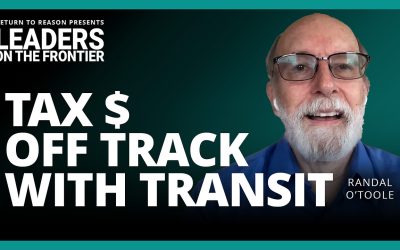
(On February 8, 2007, the Frontier Centre published a policy study by Mark Milke called Monopoly Insurance: Unfair at Any Price and the Winnipeg Free Press carried a Frontier Centre opinion piece by Dennis Owens called ”Cheaper Government Auto Insurance?”. Among other things, they questioned Manitoba Public Insurance’s claims to offer buyers of automobile insurance a better deal.
On February 13, the Free Press printed the following response from Marilyn McLaren, MPI’s President and CEO, who lays out the ways in which MPI’s offerings can be considered a better deal. As Mark Milke points out in his response to McLaren, reprinted below that, McLaren never challenges the veracity of his data or his analysis of it. She merely presents a new argument, one laced with ad hominems, a sure indication of the substantial weakness of her position. Milke, ever the gentleman, stays on the high ground.)
The View From the West, the Winnipeg Free Press, February 13, 2007
MPI gives drivers better deal, by Marilyn McLaren
A paper prepared for the Frontier Centre for Public Policy and published in the Free Press last week was a simplistic examination of insurance by Mark Milke, who has produced a number of pieces on behalf of private insurers bashing public auto insurance.
His argument is simple – Manitoba Public Insurance Corp. does not provide the value that it claims. He says the price Manitobans pay is middle of the road and that payouts are lower than in private insurance jurisdictions. He came to this conclusion by looking at averages in both areas. The problem with his analysis is that it does not consider the level of coverage people get – nor does it address the ability for people to access the coverage they've purchased.
These days, insurance is a significant expense. In exchange for our money, we expect to have access to this coverage when we need it. What we have seen elsewhere in Canada is a growing public anger among people who fork out insurance fees but then are afraid to access their coverage for fear of surcharges.
Manitoba Public Insurance provides comprehensive insurance coverage that people are not afraid to access because MPI does not penalize them for doing so. MPI only surcharges when they are responsible for a crash. Private insurers penalize customers for accessing coverage whether they were at fault or not.
It is known that throughout Canada today, there are more crashes, and just as many cracked windows and minor fender-benders, as there have always been. Yet the number of claims filed in private insurance jurisdictions continues a decade-long decline.
A 2004 Insurance Bureau of Canada report entitled Turning in on Frequency shows how the private sector has used surcharges to control claiming frequency and the severity of claims.
Between 1993 and 2003, the number of claims filed in the private sector per 100 drivers in Ontario, Alberta and the Atlantic provinces dropped from more than 20 per cent to about 10 per cent. Since then, it has dropped to seven per cent.
At the same time, the cost per claim increased from about $3,000 to more than $8,000. Today, in Ontario, that number is closer to $16,000. This is because people with more minor crashes are being forced to self-insure – either by purchasing higher deductibles or not reporting minor claims. In 2003, the average deductible in the private sector was $500 while in Manitoba and Saskatchewan fewer than one in five people pay more than $300 and three of four people pay $200.
Public auto insurance companies continue to have the highest collision claim rates. In 2005, Manitoba's claiming frequency was 9.5 per 100 vehicles, compared to 5.2 per 100 in Alberta and 3.3 in Ontario and Atlantic Canada. Over the last five years, the claiming frequency within the private sector has been about one-third that of Manitoba. In other words, any vehicle damage in Manitoba ends up an Autopac claim while elsewhere it often ends up as a personal expense.
Looking at this in another way, we know that Manitobans are not afraid to use their insurance coverage because more than 95 per cent of all repairs in the province are paid by MPI. In Ontario, more than half of repairs by garages are paid for by customers, not their insurance companies.
MPI pays out in claims more than 90 cents of every dollar of premium. This compares to payouts of about 70 cents for every dollar of premium by private insurers. In Manitoba, all customers have guaranteed access to comprehensive insurance coverage at a fair price. In some provinces, the lack of affordable insurance has forced younger drivers and seniors to stop driving. In some provinces, one in four drivers on the road are not covered by insurance, which increases the risk to everyone on the road.
If Manitobans have questions about the fairness of their insurance rates, they can hold MPI accountable before the Public Utilities Board. The rates-setting process in Manitoba is transparent — something that cannot be said of the private sector process.
When it comes to delivering value, Manitobans tell us that they want their public insurer to balance price, coverage, service and accessibility. For instance, more Manitobans tell us that they would like complete coverage rather than lowest possible cost. They also expect this coverage to be supported by comprehensive service.
Marilyn McLaren is the president and chief executive officer at Manitoba Public Insurance.
Mark Milke Responds
MPI president Marilyn McLaren's recent column was masterful in its ability to spin away inconvenient truths about the monopoly model of automobile insurance mandated by the Manitoba government.
McLaren thinks it's a virtue that MPI's average mandatory claim cost is just $2,747 compared to Ontario where the average claim cost is $15,949.
Call me a bleeding heart, but squeezing drivers after an accident by forbidding the right to sue for sums in excess of no-fault benefits and for pain and suffering – so as to keep claims costs artificially low, is hardly a virtue.
Ontarians can sue for pain and suffering and if they don't like their accident payout. That's why Ontario has higher average premiums. In contrast, Manitoba consumers must simply accept their MPI payouts and tough luck if one doesn't agree.
McLaren claims my study was all about asserting MPI doesn't give value for the dollars paid. That was only part of it. The other part of my study detailed how MPI publishes highly misleading averages for other provinces and thus misleads Manitobans. MPI claims the average premium for Toronto is $2,479 and $1,563 in Calgary. That is wildly wrong and McLaren knows it which is why she didn't mention actual cross-country averages in her letter.
Averages based upon actual paid premiums showed Manitoba's average premium was $920 in 2005, while it was $1,319 in Ontario, $1,022 in Alberta, and $1,153 in public sector B.C., all of which have significantly higher claims costs than Manitoba (as does every other province save Quebec). Provinces with cheaper average insurance costs were private sector Nova Scotia ($842), Prince Edward Island ($811) and public sector Saskatchewan ($738) with Newfoundland close behind (at $934). MPI's exaggerated averages resulted from culling insurance quotes off the internet for other provinces and pretending they represent an average of real paid premiums.
Given that Manitoba's average claim cost is about 17% that of Ontario's while its' average premium is about 70% of Ontario's, and given that Manitoba's urban density is less than that in Ontario or Alberta, MPI's insurance prices and coverage are no bargain.
Lastly, McLaren claims that Manitobans can hold MPI accountable. Hardly. Monopolies, whether in the private or government sector, cannot by definition be held accountable. It's not as if consumers can buy their automobile coverage from another insurance company. Which begs the question: If McLaren believes MPI is so good for consumers – surely MPI would thrive in a fully competitive market.
Mark Milke is author of Monopoly Insurance: Unfair at any Price


